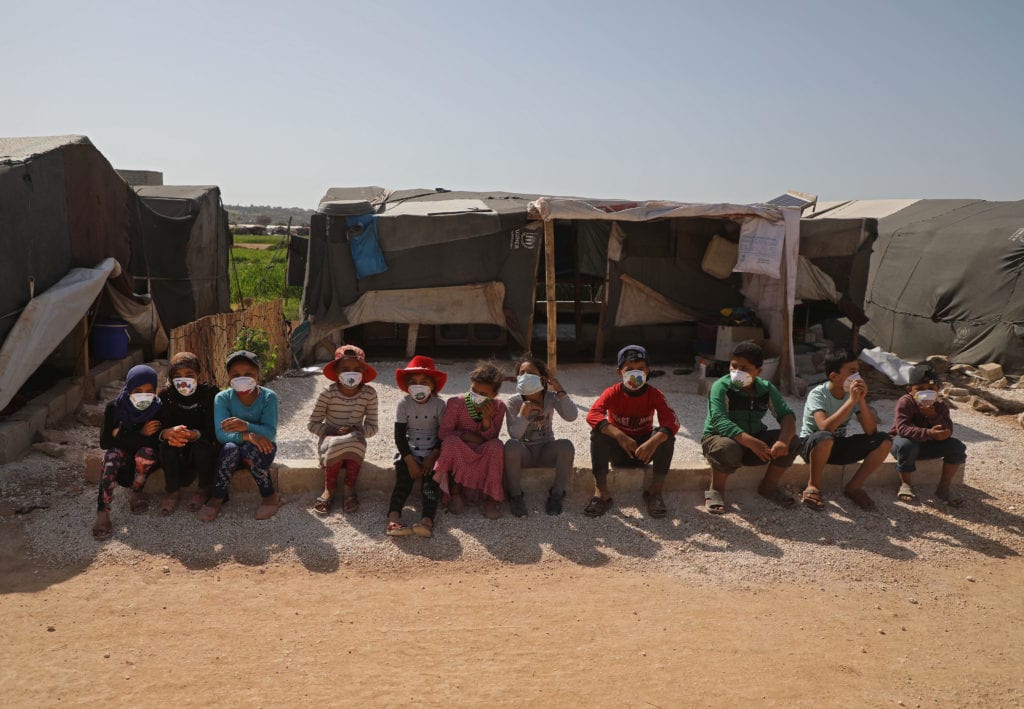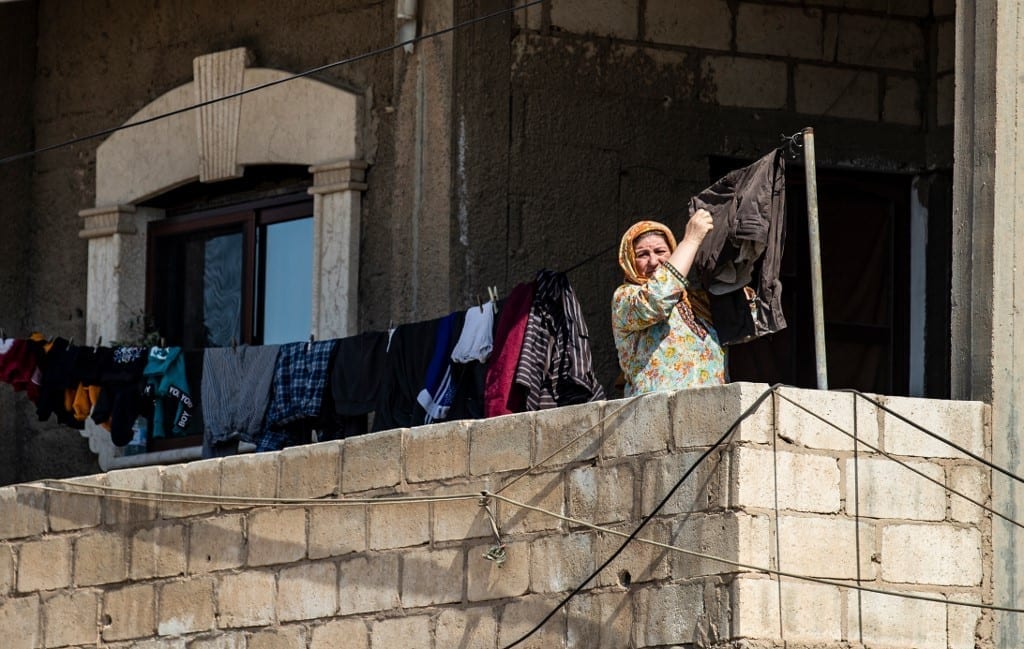“We are no longer the deer in headlights, the whole world is, even the great powers, Italy, Spain and even America, who would have ever imagined that!” exclaimed the taxi driver smugly. He used to watch news of war in his country consistently at the forefront of global events, but is now watching the countries of the world being haunted by the specter of death in every way, although he was not quite sure if we were still really out of the woods. This wasn’t about gloating, but of course it isn’t surprising that the most vulnerable people, the ones residing in a country that has collapsed due to wars and severe economic crises, will be dazzled by witnessing “great” countries fall apart, just because of a “flu”, as he called it! Actually, even if Syria were to become a hotspot of the epidemic, our driver will remain shocked, as it is almost unbelievable to him that disasters can actually devastate great countries, just like we’d been devastated!
Alas, the people who have become accustomed to death in all its forms, and who have devised ways to circumvent it, are now facing “Covid 19”. Now, everyone will have to update the numbers of their dead and begin counting down the numbers of their living, but they’ll do so in a way that suits their own lifestyle, not what the epidemic imposes; for Syrians, death is one, but the ways in which it strikes have always been innovative, almost as if they were destined to be used as examples of the strangest ways of annihilation.

Between Covering Mouths and Covering Windows
Not so long ago, snipers were dispersed along many roads leading to the capital, Damascus, targeting any passing vehicle, so that the movement of vehicles became almost impossible. I remember how we used to shut the bus window curtains, hiding behind them in order to mislead the snipers, hoping that we would arrive safely avoiding any incoming hole in the glass. Many Syrians then used to also cover the windows of their homes, at least the ones located in areas subject to the threat of sudden bombing, so that they could live behind them without fear, camouflaging themselves from the snipers. These protections could be even less than what we imagine them to be, for there is satire in the fact that you use the same material when you die, a fabric that covers you, but also to protect yourself from death itself, in using a “curtain”; the truth is we require a veil that repels the enemy’s detection of their victims. Thus, a simple curtain has transformed into a powerful defense, and because life is but a series of repetitive events, Syrians are now reliving the experience of the curtain once again, but this time in the form of a facemask. But unlike the curtain, they interact with the face mask with a lot less seriousness. They slide it onto their chins in the midst of conversations or while smoking an urgent cigarette, and then dispose of it onto the street, tripling the chances of transmitting the infection to others. Unlike the case of the curtain, they would have never even imagined that they could slide it open slightly to check if the sniper had left! The problem compounds in the nature of the enemy itself, as the visible enemy that kills by looking you in the eye is very different to the invisible one that kills you without you seeing it coming. In the end people would prefer a murderer holding a gun or a sniper rifle, is it not strange that our murderer is an invisible enemy?
At night, Syrian cities appear as if they were abandoned by their residents, while the houses burst with noises and disputes. Suddenly, we realize that many families are unhappy and the voices of shouting in the adjacent houses in Damascus cause women to tremble, even if they were not concerned.
So, we can say that the story of the Syrian people with the face masks and gloves is somewhat complicated, while sometimes people seem careful in wearing them, they also slide them down whenever they want and put them back on whenever they want, as if they know exactly the moment when the virus may attack, with a feeling of great confidence that they cannot be infected. This is exactly what is happening at the grocer’s, as the shop owner adorns gloves while handling both the cheese, and the money he’s receiving, looking at me repeating: “Look how they’ve forced us to follow these safety procedures.” I take the cheese home and somehow I don’t get Corona, and as such, the shop owner’s prophecy that the virus is a global conspiracy is validated. As for a kiosk called “Ahla Zalama” (The Most Handsome Man), specialized in selling falafel, it has taken it upon itself to prove that the Syrians’ skillset can exceed everything expected. The falafel seller and the owner of the kiosk derived this name from a phrase that he used to call out to customers or even passersby in front of his kiosk. The kiosk, which sits on a sidewalk on a public street, offers passers-by food exposed to the street’s air and pollution. Keeping in line with the coronavirus, the owner of the kiosk placed a banner reading: “Corona infects us, but falafel from “Ahla Zalama” protects us.”
Fear Disappears After Weeks
At first, it seemed like a serious threat and the fear was real, and everyone adhered to the personal safety rules, but soon somehow they all returned to their previous lifestyles. The same thing happened during the war. In the beginning, everyone denied what was happening, then they were forced to believe it, due to the numbers of martyrs, destroyed buildings and beheaded bodies. The truth is sometimes presented on a platter of blood, but fear this time is different. Syrians know fear as no other people have, but to fear a missile is different from fearing the people around you, and to fear a bullet, is not like fearing touching others. In fact, things will not work this way. Syrians need to believe what is happening, they need the two little girls in the street to stop fighting over sharing a face mask, while each of them has a go at it for 10 minutes. My friend says this time fear is bigger and more inclusive; it threatens everyone, everywhere, under any roof. It is not enough to keep away from regions of struggle in order to stay safe, nor is it enough to flee your city, but how will the Syrians believe it?
“We won’t fear any more!” It is the necessary motto of this stage, in order to overcome this crisis, and go on with life; how can a nation survive a curfew while hungry, and while thinking about how it will feed its children the next day? Hunger is more powerful than epidemics. Vegetable stalls, although simple, are a way of life; porters are waiting for a chance to carry a bag of cement, to earn their daily bread, and people crowd at the doors of food stores, waiting to get their rations of subsidized sugar and rice. Some women cover their faces with their shawls, while others scramble for sugar and rice.The scene may seem chaotic and against all the healthy practices only to those who do not need subsidized rice and can afford to buy it at twice the price! In reality, however, and for people who know the meaning of hunger, this is a moment of awe; To the cameras, it is a melancholy humanitarian image. People who can understand the grief of this country see in this crowd holiness that many cannot grasp. It can be clearly identified in the women’s cries for their shares of sugar: “I didn’t get mine, I’m not leaving without my sugar”. All this is more powerful than any epidemic, and in fact, within the tremendous amount of fear Syrians have been through, it is just routine to them, so they go out and talk about a viral infection that attacks behind closed doors, and about a war they’ve witnessed with their own eyes. In a battle between war and virus, war is always the victor, only because it has more to offer than just the symptoms of a common cold, or so say the Syrian people.


Hiding at Night
At night, Syrian cities appear as if they were abandoned by their residents, while the houses fill with noises and disputes. Suddenly, we realize that many families are unhappy and the voices of shouting in the adjacent houses in Damascus cause women to tremble, even if they are not concerned. “If this is only her husband’s voice, how hard will his slap be?” one woman asked another in the street. “No one can keep a secret now, because of the coronavirus,” she added. Syrian families were not in need of this coronavirus to reveal the fragility of these relationships, nor were the faces and bodies of Syrian women deserving of more slaps or punches. The most these women can do is to send their complaints to feminist Facebook pages, signed with their initials, in the absence of a law to protect them against domestic violence, merely meaningless trials as an outlet for their agony. From my home, I hear my neighbor screaming at his son and wife, then silence prevails. I imagine their bodies trembling under the covers trying to hide the sound of their weeping. Everyone knows that this silence is not safe.
On the other hand, men try to fit in into the routine life of their wives, discovering another world that may be their salvation during the long days, by lending a helping hand, sometimes out of boredom and sometimes out of a real desire to participate. We can say that friends’ chats during stolen evening gatherings where they play cards until dawn, waiting for the end of curfew hours, have become totally different. Each man now boasts his newly acquired skills, especially in cleaning up the kitchen, and revealing that his wife is not as spic and span as he thought she was. The recurring question is: what comes after coronavirus? Will the men be able to go back to work? Or will some of them prefer to stay in the kitchen? Will there be changes in gender roles after corona?
Syrians have felt that they are different from the rest of the world, and that their misfortune had made them either refugees, victims, imprisoned, or orphans, and always on the run from fear, living on the bare minimum on their sad days, following the lives of other people, unable to believe that life can be so generous with others.
Mass Graves and Intensive Care Beds
In a study published by the London School of Economics based on Syrian and World Health Organization reports, the number of beds equipped with respirators in Syria is about 650, half of which are already in use and this leaves only 325 beds for “Corona”. For a moment, one takes this information in as if it were a joke, but it is the sad truth. In some cities, there are no hospital beds, like Deir ez-Zor, which was totally destroyed by ISIS. No one wants to think about how things will be in case the disaster happens. It may result in mass graves without massacres, and there may be a need for distant locations to hide these graves. But there is a great difference between mass graves for unidentified bodies and others that can hardly accommodate all the bodies. Syria has not reached this stage yet, but we are facing a real comparison between two lives, one with the war, and another with the epidemic. This comparison entitles imagining what will happen, at least so as not to be unfair towards the war.
Life imposes a form of language appropriate to every crisis or stage of life, so some vocabulary and expressions relate to a certain issue, and thus the identity of this issue is formed, through a series of common terms and expressions. The vocabulary of the war is well-known; “killing, attacks, bullets, explosion, missile, victims, martyrs, rape, …etc.” As for the epidemic, the vocabulary is totally different; “pandemic, infection, virus, symptoms, statistics, cases, vaccine, … etc.”
Our old neighbor still calls the deaths of Corona “those who were martyred”, as if the war cannot leave his mind. He is used to death in the form of killing or martyrdom, and his war memories will not accept the mere word “deaths”. When I told him, “Do you mean deaths?” He totally refused, confirming that there is no difference. Isn’t a person who is killed “martyred”?! And isn’t a deceased person “dead”?! When I explained to him that a killed person must be the victim of war and that a dead person may be a victim of an internal cause, like cancer, or coronavirus, he shook his head and said, “Aren’t they all dead in the end?”
Waiting for Salvation
Syrians today are waiting, with the rest of the world, for a miracle and salvation, waiting for the day when a vaccine for this epidemic will be discovered. For the Syrians, waiting for a great event like the rest of the world, as if they were a real part of this universe, is an honor and a victory equivalent to finding the vaccine. The salvation does not have to be a vaccine, it may be that the people go back to becoming part of a collective fear and a global expectation of salvation, contrary to what happened during the past nine years, when the Syrians were the crisis, their life a distraction for the rest of the world, and their issue a debate in all forums, as if they were actors in a TV series. Yes, the Syrians have felt that they are different from the rest of the world, and that their misfortune made them either refugees, victims, imprisoned, or orphans, and always on the run from fear, living on the bare minimum on their sad days, following the lives of other people, unable to believe that life can be so generous with others.






